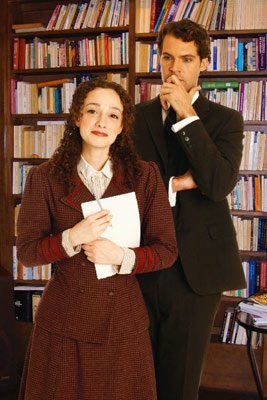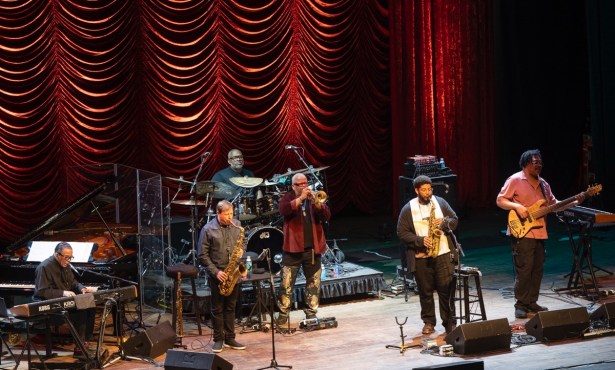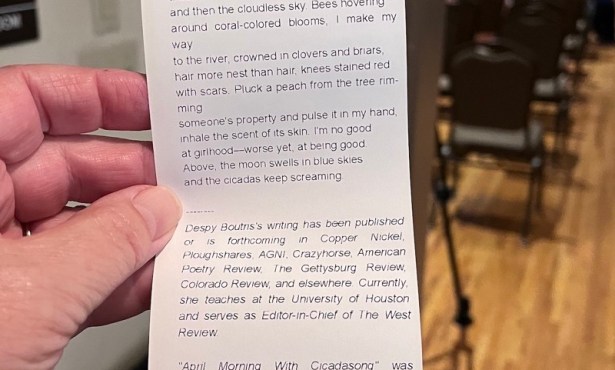New John Caird Musical Daddy Long Legs Premieres at Rubicon
A 1912 Novel About an Orphan and Her Benefactor Becomes a Contemporary Musical
If you’re like most Americans, the title ‘Daddy Long Legs‘ rings an extremely distant bell. Jean Webster’s 1912 novel, a coming of age story about a high-spirited orphan girl, was an enormous best seller in its day, but it slowly faded into obscurity over the decades. An ill-conceived 1955 film adaptation starring Fred Astaire and Leslie Caron may have been the final blow.
But in Japan, the book remains extremely popular. So when the Japanese-born wife of renowned British theater director John Caird discovered he hadn’t read it, she was quite surprised. At her insistence, he opened a copy-and discovered a masterpiece.
Caird knows something about adapting novels for the theater: He codirected the original London and Broadway productions of Les Miserables and Charles Dickens’ Nicholas Nickleby. For his latest project, he has turned Webster’s forgotten classic into a small-scale musical. Daddy Long Legs will have its world premiere Saturday night (Oct. 17) at the Rubicon Theatre in Ventura.

Translating the piece from page to stage was, to put it mildly, a challenge. Except for the first chapter, it is written as a series of letters from the central character, the penniless orphan Jerusha, to the wealthy man who is paying for her college education.
She has no idea who her benefactor is, having only glimpsed him once. But she writes to him regularly, describing her day-to-day life and revealing what it’s like for a smart, sensitive young woman to enter the adult world of a century ago.
In the novel, the communication is all one way: Her benefactor, wishing to retain his anonymity, never writes back. When Caird approached his longtime collaborator John Gordon-they previously worked together on musical adaptations of Jane Eyre and Jane Austen’s Emma-the composer quite logically envisioned it as a one-woman show, and quickly wrote a cycle of 10 songs for Jerusha to sing.
Caird, however, felt the material needed something more. He turned to critically acclaimed choreographer David Parsons, who helped turn it into a dance-theater piece. “It worked wonderfully well, in a way,” Caird said. “But it was ultimately too complicated and expensive,” Gordon added.
“The more we looked at it,” Caird said, “we realized there was something missing”-specifically, the title character. “We didn’t understand his motive-what was going on inside his head,” he said. “One day I took a deep breath and said, ‘He’s got to have some songs.'”
Caird sat down and wrote a series of letters from the unnamed benefactor to Jerusha-letters he ultimately decides not to mail. “We had to extrapolate from the letters she writes to him, as to what he’s like and what his motives are,” he said. “We had to do quite a bit of detective work.”
“That triggered his voice for me,” Gordon said. “I musicalized several of those letters. Then it just grew.”
That deep-breath decision gave the show its shape: It consists almost entirely of letters the two characters write to one another, roughly half of which are sung and half spoken. Just as importantly, it also helped the creators hone the work’s central theme.
“It started to make us ask bigger questions about the material,” Caird said. “Their relationship raises a lot of question about the act of charitable giving. If you are in receipt of cash from someone, how does that affect your relationship? What does dependence do for friendship? Emotionally, it’s very complex.”
Although the story is set in the years 1908 to 1912, don’t expect to hear ragtime or any other musical style of the era. “I believe that if you find the right musical resonance for the storytelling, the period is not so important,” said Gordon, whose pop hits include “Next Time I Fall,” recorded by Peter Cetera and Amy Grant. “I wouldn’t put electric guitars in the show, but I’m using a pop band with some strings-acoustic guitar, piano, cello, violin, bass and drums.
“There are some very musical-theater moments, but some of it is pop-folky; it could fit on a Shawn Colvin record. I wrote four of five of the songs on guitar, which I don’t usually do for my musicals. I’m probably going to layer even more guitar into it, giving it a slightly surprising musical quality for the period. I’m hoping the music is organic to the storytelling.”
The world premiere is a coproduction of three companies: Rubicon (which hosted a workshop of the show in 2008), TheaterWorks in the San Francisco Bay area (where it opens in January) and Cincinnati Playhouse in the Park (which follows in March). Other regional theaters have also expressed interest, but Caird is ambivalent about taking it to Broadway. “This show is nothing like Legally Blonde or Hairspray,” he noted.
But he is convinced the story will resonate with contemporary audiences. Jerusha’s strength, intelligence and determination gives it a feminist quality that should appeal to mothers and daughters. What’s more, the work contains a spiritual message that is familiar from some of today’s best-selling self-help books.
“Jerusha says ‘The way to happiness is to live fully in the now,'” Gordon noted. “I’m sure some reviewer will complain that a woman from that period wouldn’t say such a thing, but it’s directly from the novel.”



